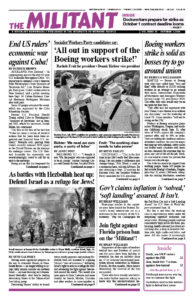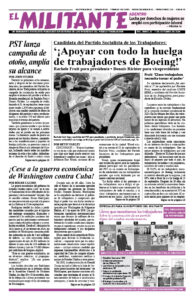Unlike Hamas, whose roots are in Egypt’s Sunni Muslim Brotherhood and its collaboration with the Nazis during World War II, Hezbollah was a direct creation of the regime that took power through a counterrevolution in Iran after pushing back the 1979 popular revolution that overthrew the U.S.-backed shah.
Lebanon, which was under French colonial rule after the first imperialist world war, won its independence in 1943. The government setup included Maronite and Orthodox Christians, Sunni and Shiite Muslims, Druze, Armenians and other minorities. Its first constitution included representation for 18 distinct religions. Since then the three highest offices — the president, prime minister and speaker of parliament — are divided between a Maronite Christian, a Sunni Muslim and a Shiite Muslim respectively.
Added to the mix were thousands of Palestinian refugees who fled the 1948 war launched by five reactionary semifeudal Arab regimes against Israel after the U.N. recognized it. Palestinians and their children are still denied citizenship or even the right to own property in Lebanon.
This unstable arrangement exploded in a civil war that lasted from 1975 to 1990, including a long Syrian military intervention. Israeli troops occupied parts of the country from 1982 to 1984, in response to attacks by Lebanese-based units of the Palestine Liberation Organization. The war devastated Lebanon and left more than 100,000 dead and 1 million displaced.
Seeing an opportunity to extend its counterrevolution in the region while presenting itself as leading the fight against U.S. imperialism and for Lebanese sovereignty, Tehran in 1982 — with the agreement of the Syrian dictatorship — sent some 1,500 Islamic Revolutionary Guard Corps “advisers” to work with Shiite-based militias to form “The Party of God” — Hezbollah.
In 1985, Hezbollah issued an “open letter,” which remains its program to this day. It denounced Washington for supporting “the Zionist entity that has usurped the sacred Islamic land of Palestine” and claimed that “the Jew” is the biggest enemy Muslims face. Mixing anti-imperialist rhetoric with open Jew-hatred, Hezbollah said its main goal was the “final obliteration from existence” of Israel.
Despite being supported only by a minority of Lebanese, Hezbollah — with millions of dollars of funding and weapons from Tehran — became the most powerful force in the country, much more powerful than the Lebanese army. Its participation in the fractured government ensures that no measures are taken that could limit its power or Tehran’s reactionary influence.

